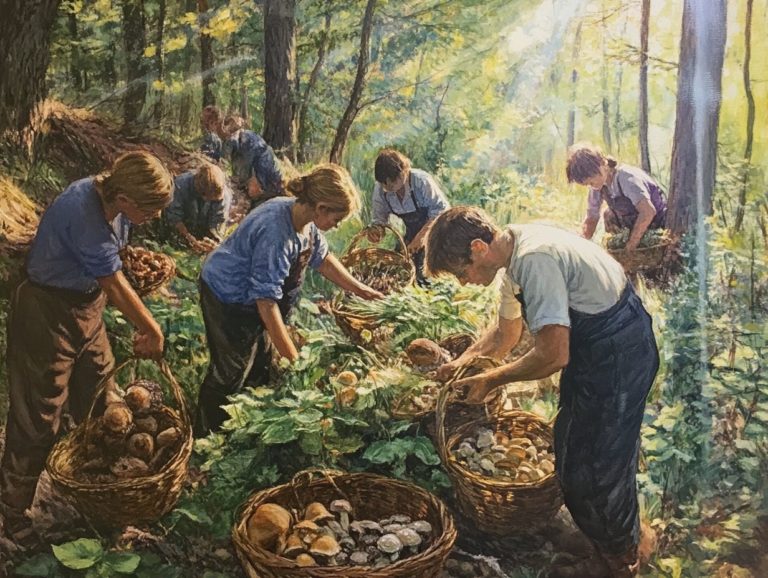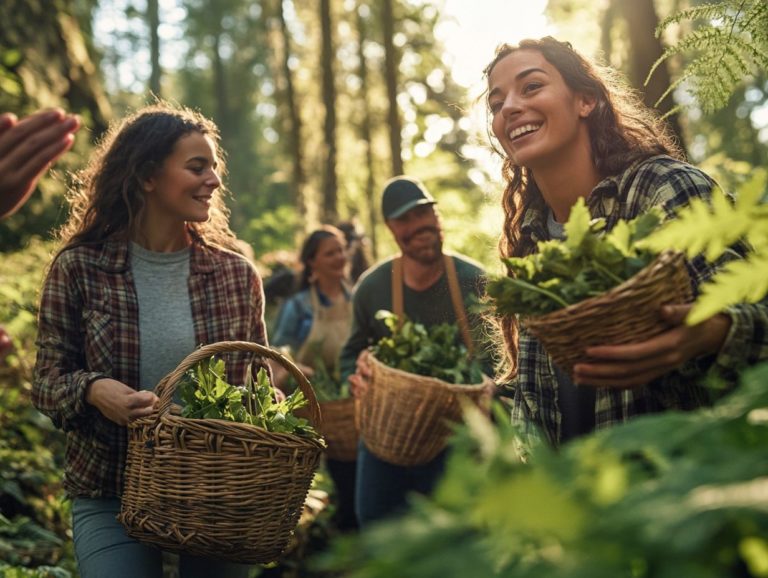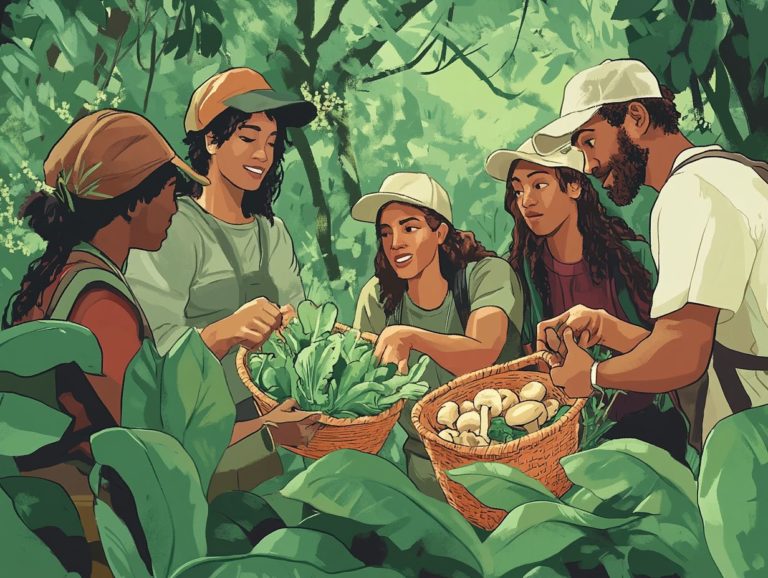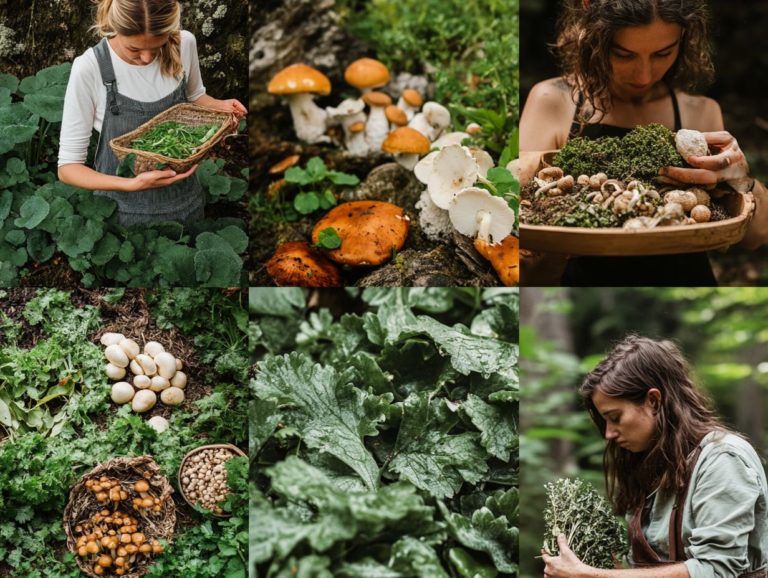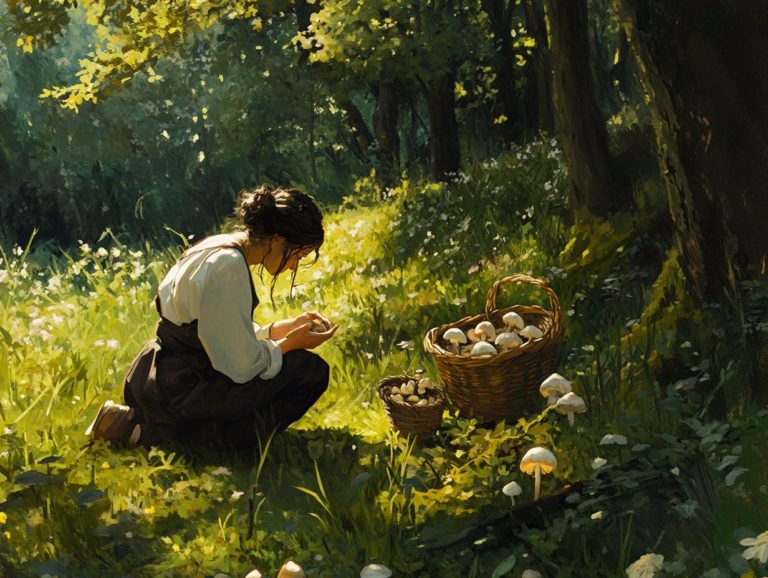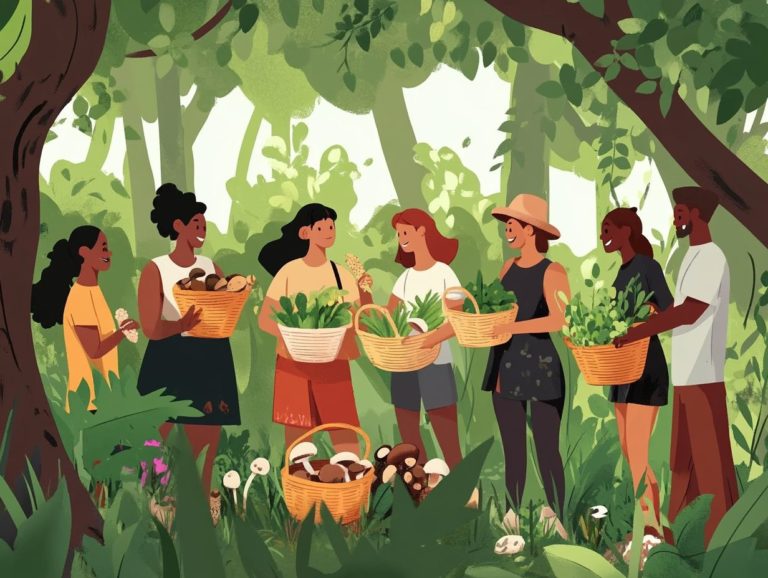The Future of Foraging Communities
Foraging, the art of gathering wild food and understanding the complex systems of resource survival, is steeped in human history and remains vibrant in today s society.
Join us as we explore the journey of foraging communities, tracing their origins and evolution through the ages while highlighting their traditional knowledge and cultural practices. Discover the challenges and opportunities these communities face today and how you can be part of the solution!
Additionally, the discussion also covers the impact of technology on modern foraging techniques, such as mobile apps that enhance decision-making and visual cognition. Dive in as you uncover the rich tapestry of foraging behavior and its essential role in our lives today, connecting us to the natural environment.
Contents
- Key Takeaways:
- History of Foraging Communities
- The Current State of Foraging Communities
- The Future of Foraging Communities
- Sustainable Foraging Practices
- Modern Foraging Techniques
- Frequently Asked Questions
- What does the future hold for foraging communities?
- How will climate change affect foraging communities?
- Will foraging communities continue to exist in the future?
- What role does modernization play in the future of foraging communities?
- How can we support the future of foraging communities?
- What cultural shifts may impact foraging communities in the future?
Key Takeaways:
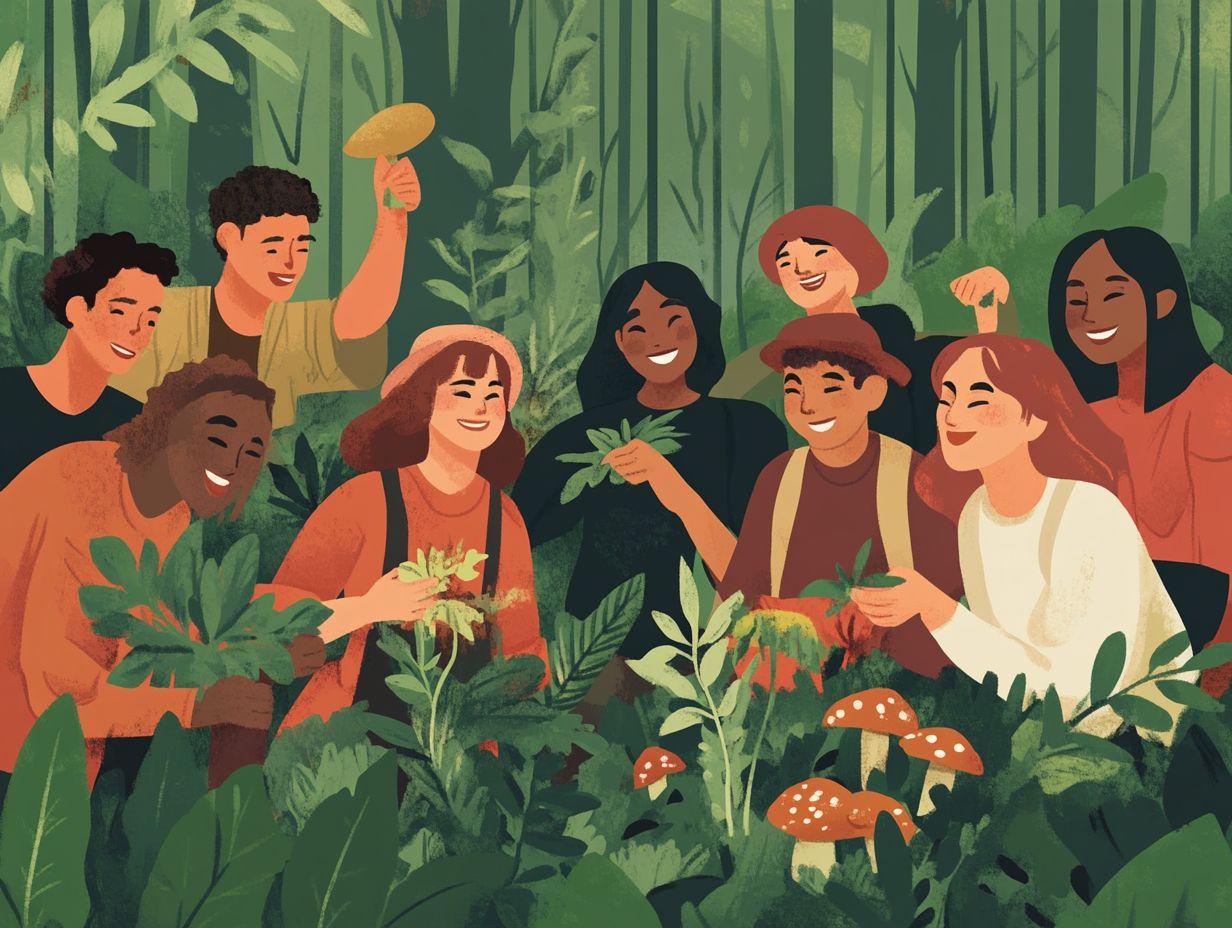
- Foraging, often called gathering, is essential for survival find out why!
- The current challenges and opportunities faced by foraging communities highlight the need for sustainable practices and technology incorporation, addressing issues like invasive species and urban foraging.
- The future of foraging communities holds potential for a balance between traditional knowledge and modern techniques, including insights from neuroscience that can lead to greater environmental conservation and cultural preservation.
Understanding Foraging: A Vital Skill for Survival
Foraging is the art of seeking out and gathering food from nature, a practice vital for survival among both animals and humans. It is influenced by behavioral studies and decision-making strategies. This engaging behavior involves techniques designed to identify and collect wild plants, mushrooms, and other edibles.
It s often shaped by intricate cognitive processes that reflect your nutritional needs and understanding of the surrounding ecological context.
The importance of foraging goes beyond simply filling your stomach; it enhances food security by providing a diverse array of nutritional sources that can adapt to ever-changing environmental conditions. This behavior nurtures personal well-being and supports ecological balance, fostering biodiversity and the health of habitats.
Traditional knowledge, passed down through generations, emphasizes recognizing seasonal patterns and sustainable practices, which are essential for preserving ecosystems.
You, like many other beings, engage in foraging, contributing to a complex web of interactions that sustains various species and reinforces the interconnectedness of life itself.
History of Foraging Communities
The history of foraging communities reveals the remarkable evolution of human interaction with the environment. Cultures like the Hadza people of Tanzania exemplify this, having cultivated knowledge passed down through generations about the environment that has sustained their communities through hunting and gathering practices for millennia.
Origins and Evolution of Foraging Societies
The origins of foraging societies can be traced back to early human ancestors who relied on gathering wild plants and hunting animals as their primary means of sustenance. Over millennia, this reliance evolved into complex systems of social organization and traditional ecological knowledge.
As these societies flourished, they adapted to various environmental contexts, resulting in a rich tapestry of hunting techniques and gathering practices. Key evolutionary milestones, such as the refinement of stone tools, enabled greater efficiency in food collection, enhancing their ability to exploit diverse ecological niches. This adaptation spurred population growth and nurtured intricate networks of exchange and communal knowledge.
Over time, knowledge about seasonal patterns and local flora and fauna became essential for survival, shaping cultural identities and influencing social structures within these foraging communities.
Now is the time to engage with the rich heritage of foraging. Explore local foraging groups, read more articles, and connect with your community to deepen your understanding and appreciation of this vital skill!
The Current State of Foraging Communities
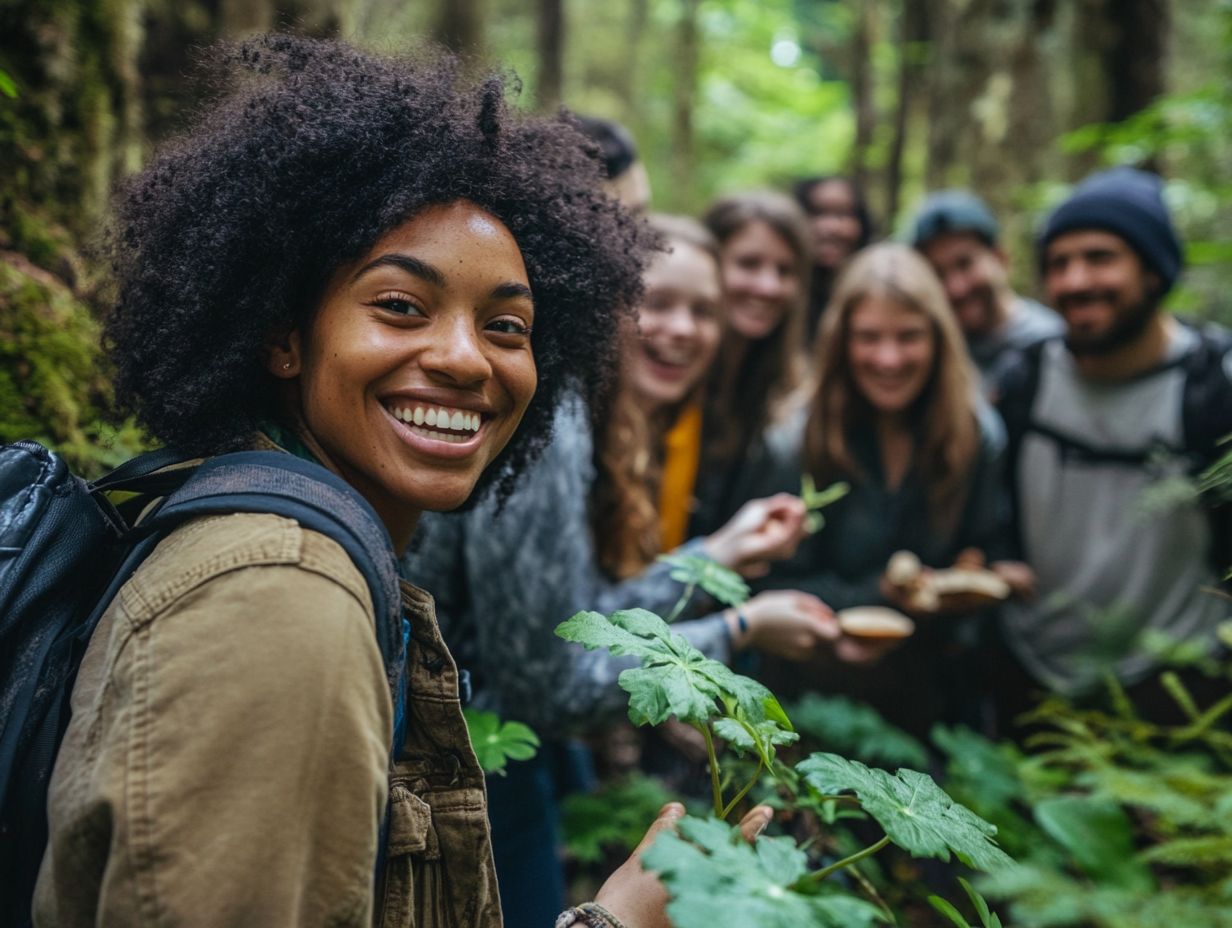
Today, foraging communities are witnessing a remarkable renaissance, especially in urban settings where people are re-discovering the art of gathering food from their immediate environment. This revival highlights the importance of local foraging networks in fostering community and resource sharing.
However, this revival isn t without its challenges. Navigating invasive species and embracing sustainable practices are essential to ensure that this age-old tradition thrives in a modern context.
Challenges and Opportunities
The challenges and opportunities in foraging today are intricate. You navigate a landscape shaped by the growth of cities and environmental changes, while exploring diverse ecological systems for wild food.
Legal restrictions can often stand in your way, making it crucial to understand local regulations and public land access if you want to forage responsibly.
Resource depletion presents significant hurdles too; overharvesting and habitat loss threaten the very plants you seek. Add climate change to the mix, and you find habitats shifting along with the growth patterns of many wild edibles.
Yet, amid these challenges, vibrant community initiatives are flourishing. They offer workshops and gatherings that encourage the sharing of traditional knowledge. These collaborative efforts empower you to connect with your environment while fostering a deeper appreciation for sustainable foraging practices.
The Future of Foraging Communities
The future of foraging communities looks incredibly promising! An increasing awareness of health benefits, sustainability, and self-sufficiency inspires more individuals to embrace foraging practices. This shift fosters community building and deepens your connection to nature, as highlighted in trends in sustainability.
Now is the time to engage with these practices and contribute to a movement that values both personal well-being and ecological mindfulness.
Predictions and Possibilities
Predictions for the future of foraging suggest that you will witness an exciting fusion of traditional knowledge with modern techniques. As urban foraging continues to gain traction, communities will increasingly seek to reconnect with nature through sustainable practices, including the role of community in sustainable foraging, combating nature deficit disorder.
This transformation is likely to bring about innovative methods that leverage technology to enhance your foraging experience. Imagine using mobile apps that can identify edible plants or offer real-time updates on local foraging hotspots at your fingertips!
As more individuals like you engage in these activities, community involvement will become essential in promoting sustainable practices, fostering a sense of collective responsibility, and creating a true sense of belonging. These connections not only facilitate knowledge sharing but also significantly boost mental well-being, as participants often discover solace and joy in the shared adventure of exploring and respecting the natural environment around them.
Sustainable Foraging Practices
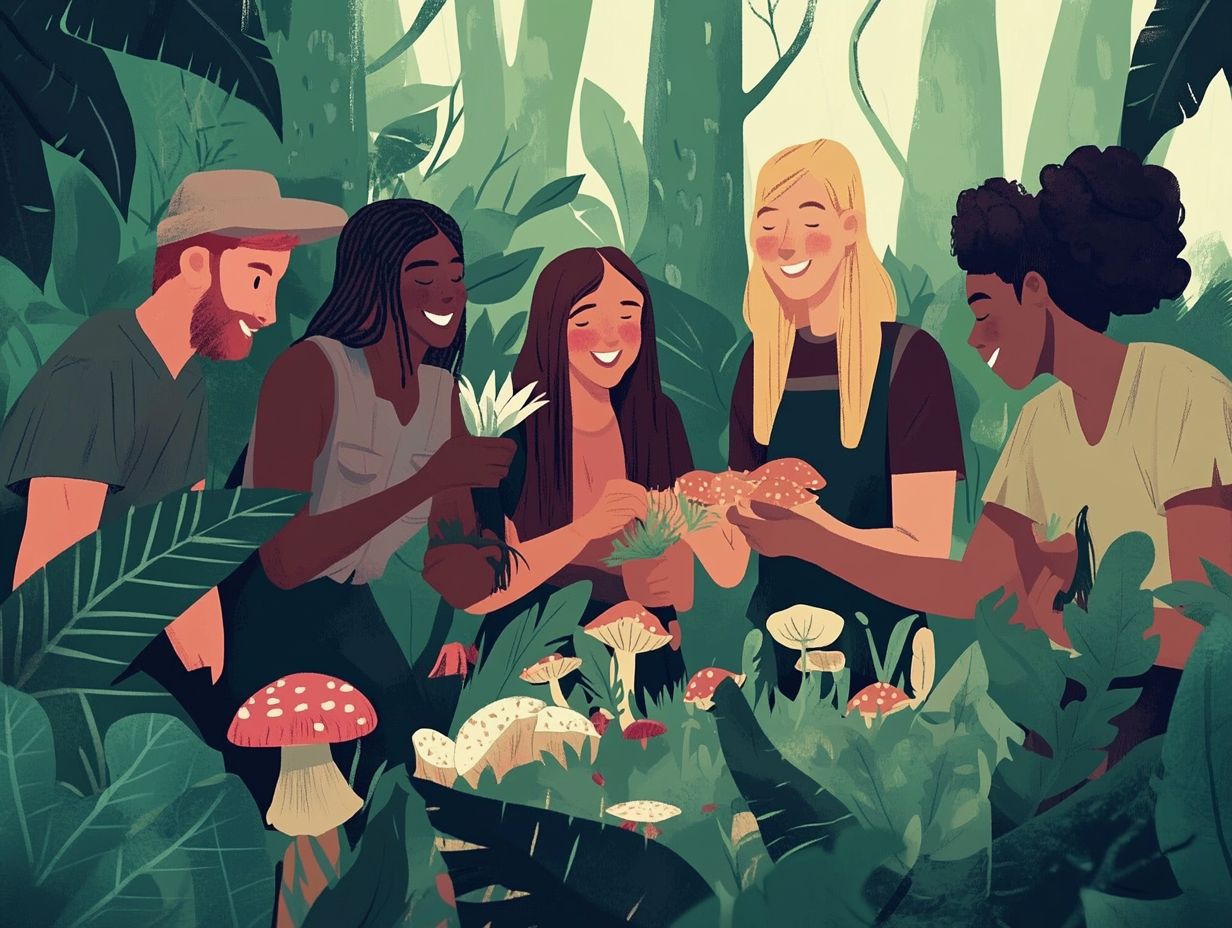
Embracing sustainable foraging practices is crucial to minimize environmental impact while actively contributing to the conservation of biodiversity and natural resources.
This approach allows communities like yours to gather food in a way that respects and maintains the delicate ecological systems upon which you depend.
Join a local foraging group or attend a workshop to learn more!
Environmental Impact and Conservation Efforts
The environmental impact of foraging, especially when approached with sustainability in mind, can yield remarkable benefits for conservation efforts. This practice supports healthy ecosystems and preserves the variety of plant and animal life, all while enriching community engagement.
By immersing yourself in responsible foraging initiatives, you cultivate a deeper appreciation for the local flora and fauna. This fosters a sense of stewardship within your community. Programs such as community foraging workshops and guided nature walks emphasize the significance of right ways to gather food and underscore the vital role these activities play in maintaining ecological balance.
These endeavors reinforce the connection between people and their natural surroundings. They highlight the connection essential for ecological health. These initiatives also promote sharing indigenous knowledge, enriching cultural heritage and enhancing communal ties among participants.
Modern Foraging Techniques
Modern foraging techniques have transformed, seamlessly integrating technology and innovative strategies. This evolution enhances your ability to gather food from your surroundings while also engaging your thinking skills that bolster decision-making and resource selection.
Embracing these advancements allows you to navigate your environment with increased efficiency and insight.
Incorporating Technology and Innovation
Incorporating technology and innovation into your foraging practices opens up a world of vital information about wild plants and mushrooms. This enriches your foraging experience and deepens your connection to the local environment.
Thanks to mobile apps, you can quickly discover which plants are safe to eat or potentially harmful, adding a crucial layer of safety to your adventures. Community forums and social media platforms provide spaces for you to share experiences, exchange tips, and even barter for unique finds. This fosters a strong sense of belonging among fellow enthusiasts.
These technological tools do more than just make foraging accessible; they also promote sustainable practices as you learn to identify and protect local ecosystems. As urban dwellers increasingly embrace foraging as a means to reconnect with nature and their neighbors, technology plays a pivotal role in bridging that gap, cultivating community engagement and facilitating the sharing of knowledge across diverse populations.
Frequently Asked Questions
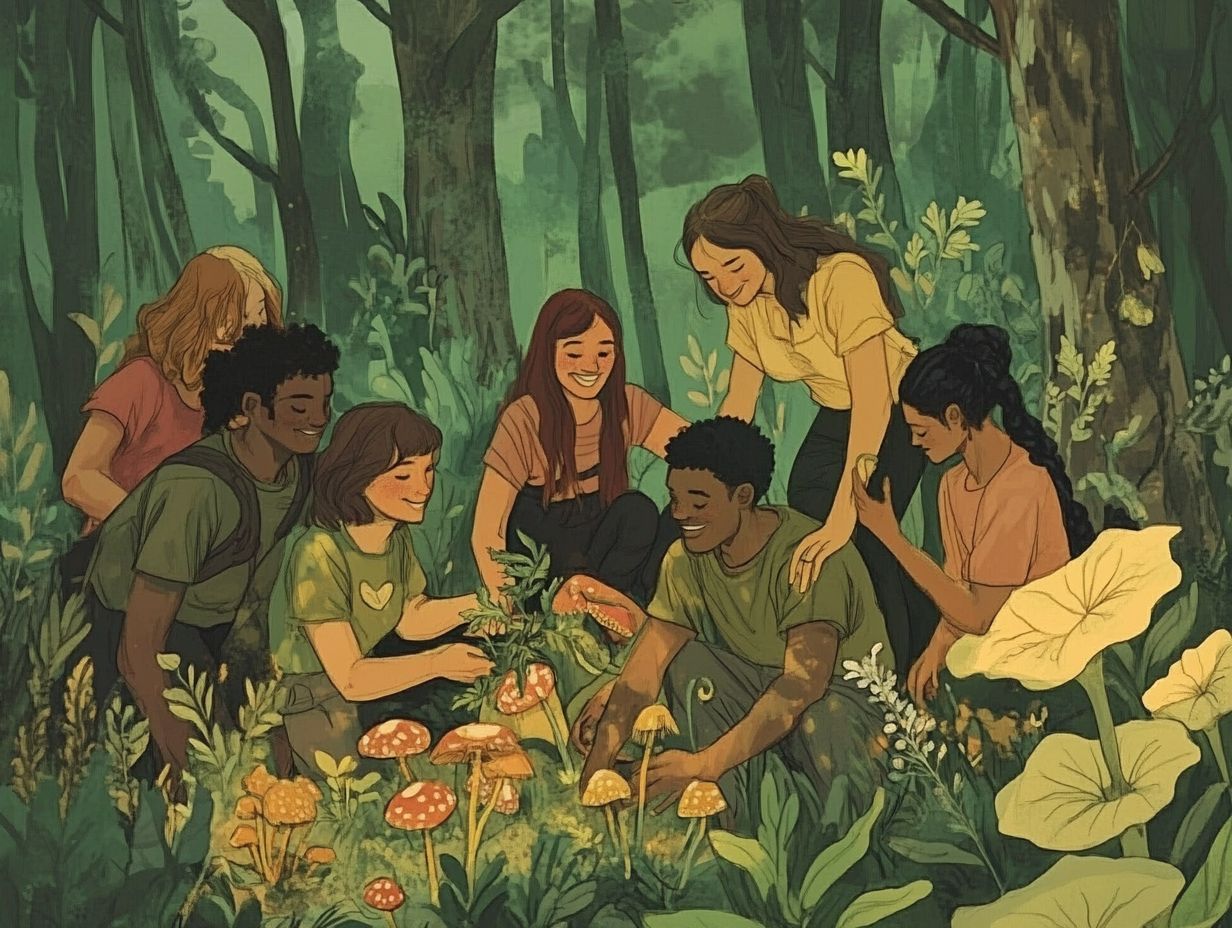
What does the future hold for foraging communities?
The future of foraging techniques in communities is uncertain, influenced by various factors such as climate change, modernization, and cultural shifts.
How will climate change affect foraging communities?
Climate change is expected to have a significant impact on foraging communities as it alters the availability and distribution of resources.
Will foraging communities continue to exist in the future?
It is likely that foraging communities will still exist in some form, but they may face challenges in adapting to modern society and understanding the role of community in foraging practices while preserving their traditional way of life.
What role does modernization play in the future of foraging communities?
Modernization, such as the introduction of agriculture and industrialization, has greatly impacted foraging communities and may continue to do so in the future.
How can we support the future of foraging communities?
Supporting sustainable practices, preserving traditional knowledge, and respecting the rights of foraging communities are important ways to support their future.
What cultural shifts may impact foraging communities in the future?
The adoption of Western values and the loss of traditional knowledge and practices may lead to significant changes in foraging communities in the future.

